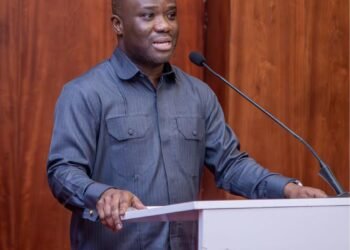As the country prepares to go to the polls in December this year, 2024, concerns have emerged regarding the increasing voter apathy in the country due to the current economic challenges the country is grappling with.
Voters nationwide have shown their displeasure with the two major political parties with most taking a decision not to vote at all while others are indecisive about whether to vote or not.
Research conducted by Global InfoAnalytics disclosed that as high as 23% and 22% of voters from the Ashanti and Greater Accra regions respectfully have made known their decision not to vote in the impending elections.
This alarming degree of voter apathy questions how democratic the coming election will be and how it will reflect the will of the majority which is the main aim of free and fair elections.
Senior member of the Convention People’s Party (CPP) and Lawyer, Esq. Kwame Jantuah, indicated that the increase in voter apathy especially in the Ashanti region does not bode well for, “the party that claims it is their stronghold”, the New Patriotic Party (NPP).
He however noted that it is too early to decide based on the data provided by research whether or not voters will act on their current sentiment during the December polls. He indicated that the figures provided by the research would be true if campaigns were robust and the competition was strong.
He therefore argued that it is too early as vigorous campaigns have not begun yet, hence the data provided by the research may not be reflected in the voter turnout during the elections, stressing that human behavior is bound to change.
“Because the present moment, if you look at where the country is, everybody is under pressure of the economy. If we are going to straighten things then people have to vote. The apathy would allow either of the major political parties or even some of the smaller parties to cause trouble for those who think they can win the election… I will say early days yet and these figures will come down”.
Esq. Kwame Jantuah
2024 Election Off To A Run-Off
Furthermore, Esq. Kwame Jantuah stated that Presidential election-wise, the current rate of voter apathy if it reflects in the 2024 General elections will result in a run-off election between the two main political parties.

He noted that though there are party stalwarts of the two major political parties, the outcome of elections in Ghana is decided by floating voters who vote based on their conviction of the country’s economy.
Accordingly, Esq. Kwame Jantuah emphasized that this group of voters, floating voters, are presently the ones who are indecisive on whether or not they would exercise their franchise.
Subsequently, the NPP’s Director for Elections and Research, Evans Nimako, commenting on the research report accused Global InfoAnalytics of presenting a fake report, alleging that the data provided by the report is “bogus”.
He pointed out that a report in April could not possibly have any effect on the December 2024 polls, while he asserted that the party’s flagbearer, Dr. Mahamudu Bawumia will have a landslide victory over his major opponent, John Dramani Mahama of the NDC at the polls.
“So let Mr. Mussa Dankwa [of Global Infoanalytics] have this clear in his mind. In all the publications he has done where NPP is involved, I’ve not on any occasion written off his outcome but it’s becoming one too many. This will not change the position of the New Patriotic Party across the country…we have more numbers than the NDC”.
Evans Nimako
Moreover, Mr. Nimako revealed that the NPP is conducting an in-house arrangement that will ensure that party members turn out massively to vote for the party’s candidate to ascertain the NPP’s victory, indicating that the NDC’s victory as predicted by earlier research is faux.
Conclusively, the NPP Researcher indicated that contrary to the report, there is no voter apathy in the Ghanaian political spheres. He emphasized that the voter turnout during the coming election will prove him right and the report of Global InfoAnalytics wrong on the issue.
READ ALSO: Africa’s Digital Tax Frontier: Evidence vs. Revenue




















